|

Winter 2003 (11.4)
Pages
84-89
BTC Section - From Pipedream to Reality
Moving
Along - The Pipeline is Being Laid
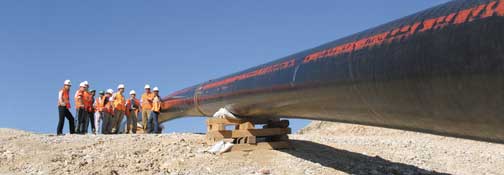
Above: A quarter of the BTC pipeline will be
physically complete by the end of 2003 and work will continue
on many sites throughout the winter months.
As 2003 ended, virtually
all the arrangements needed to secure the financing of the Baku-Tbilisi-Ceyhan
pipeline project had fallen into place. The last act of a highly
complex two-year process began in early November with the decisions
of the International Finance Corporation (IFC)-the private finance-lending
arm of the World Bank - and the European Bank for Reconstruction
and Development (EBRD) to supply credits of $250 million for
the BTC pipeline.
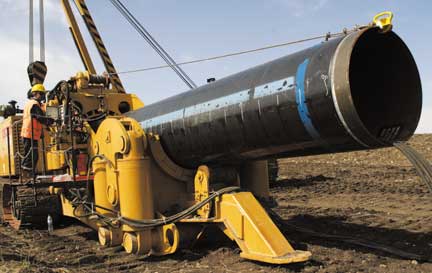  In
the weeks that followed, these decisions opened the way for export
credit guarantee agencies in six countries - France, Germany,
Italy, Japan, UK and USA - to finalise commitments to provide
funding, guarantees or insurance cover on the loans being raised
to fund the pipeline. In
the weeks that followed, these decisions opened the way for export
credit guarantee agencies in six countries - France, Germany,
Italy, Japan, UK and USA - to finalise commitments to provide
funding, guarantees or insurance cover on the loans being raised
to fund the pipeline.
In parallel with these developments, four commercial banks -
Societe Generale, ABN Amro, Citibank and Mizuho-selected by the
BTC Company to lead efforts to raise internationally - syndicated
funding of $1.2 billion for the project, were approaching other
commercial banks. By mid-November, a total of 15 banks had agreed
to underwrite debt of $1.8bn, which is $700ml more than is envisaged
necessary in what amounted to an enormous vote of confidence
in the viability of the project.
Subsequently, framework documentation in a number of languages
has been produced and agreed upon by lawyers representing the
many commercial and governmental interests underwriting the pipeline,
with a view to wrapping up legal agreement around the borrowing
regime by the end of the year. The first drawn down loan is likely
to be made in January or February 2004.
Debt will comprise 70 percent of the BTC project's funding with
the other 30 percent coming from equity funding from the Sponsor
companies of the BTC Co. The consortium's share was agreed upon
earlier in 2003 and has been in place since the summer in order
to facilitate construction. The total bill for the project -
including construction costs, borrowing and interest payments,
professional fees, contingency reserve funds and line fill (the
cost of initially filling the pipeline with oil) - is likely
to reach $3.6bn.
The IFC/EBRD approvals followed more than two years extensive
scrutiny of the project's environmental and social impact by
the two institutions. The loans have been made at commercial
rates of interest and are conditional on the project meeting
its public commitments. They will be subject to regular audits
by the lenders.
BP plc, the main sponsor of the BTC project, has also agreed
with the EBRD to launch a Regional Development Initiative to
create long-term jobs and sustainable development after pipeline
construction is complete.
Below: Working on the pipeline right of way
to the West of Tsalka in Georgia.
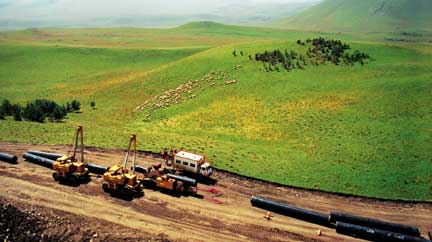  The IFC Rationale The IFC Rationale
On making its decision to back the BTC project, the International
Finance Corporation (IFC) issued a report explaining its rationale
and answering criticisms made by some non-governmental organisations
(NGOs).
"The IFC feels strongly that these projects are sound,"
the report states. They are led by "strong project sponsors
that take environmental and social issues seriously...The projects
have carried out world-class Environmental and Social Impact
Assessments and mitigation measures, implemented significant
programmes and allocated over $37 million for environmental,
social and community development."
Nine distinct benefits from BTC and associated projects are highlighted
in the report. They include transit fee revenues, the establishment
of high quality operations to international standards, the creation
of a new route to international markets that will make the Caucasus
region a major international energy player, and the provision
of gas into domestic energy networks in Azerbaijan, Georgia and
Turkey.
Other benefits mentioned are employment during construction,
opportunities for local business, follow-on foreign direct investment,
community investment programmes, and help in promoting economic
and political links between the region and the West.
The report responds directly to claims about the project made
by some international NGOs:
· On the route: "The route chosen was the
only viable one..." Sections near Lake Tsalka and the Borjomi
area in Georgia "will be the two most protected sections
of pipeline in the world."
· On oil spills: "IFC is satisfied that the
risks have been minimized...to an acceptable level."
· On consultation: The many meetings held in the
past two years make this "one of the most community and
NGO interactive projects completed to date." The report
states that Borjomi residents felt "they had been made fully
aware of the risks from an oil spill and found them acceptable."
· On accountability: "IFC believes that the
level of monitoring and transparency is unprecedented."
· On the legal framework: Nothing has been identified
so far by the IFC "that may be inconsistent with the rights
to life, liberty, fair trials, etc., conferred by the Universal
Declaration of Human Rights or the European Convention on Human
Rights."
· On land acquisition: BTC procedures "will
raise the bar considerably in these countries...and be the benchmark
and expectation for similar projects involving land acquisition
in the future."
· On resettlement issues: "There are more
than 750,000 people living in villages and towns within the vicinity
of the 1,768 km pipeline which makes it remarkable that there
is not even one instance of physical relocation."
· On compensation: "Rates are consistently
higher than local market rates for any land type that the pipe-line
traverses." The money "is contributing significantly
to providing developmental benefits to households."
· On the Kurds: "In all respects, the situation
of Kurdish speakers in relation to the project has been found
to be identical to that of mainstream Turkish villages."
· On corruption: "The BTC Company...has in
place management systems which will ensure transparency and fairness.
Below: Villages such as this one near Erzurum
in Turkey are already seeing benefits from the BTC Community
Investment Programme.
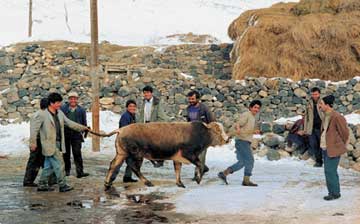  One Year of Progress One Year of Progress
About a quarter of the physical work needed to build the Baku-Tbilisi-Ceyhan
oil pipeline will be completed by the end of 2003 at a cost of
$1.5 billion - just 16 months after the ceremonial pipeline-laying
that marked the formal start of construction in September 2002.
Around $2.3bn of the overall $3bn budget has been committed,
the project is on schedule for completion by early 2005, within
budget, and it has already exceeded its employment target of
10,000 workers.
Rapid progress has been recorded since May when actual construction
began. By late-November, more than 550 km of the pipeline right-of-way
corridor had been prepared on the territories of Azerbaijan,
Georgia and Turkey, about 250 km of trench dug, 400 km of pipe
strung out alongside the trenches prior to welding and laying,
350 km of pipeline welded and another 300 km of pipe prepared
for welding. Several construction camps had been built and about
11,300 people were working on the project.
During the winter months, pipe-laying and other construction
activities will continue in accessible regions in each country.
Completion of the foundations for most of the eight pump stations
before the worst weather set in will make it possible for construction
to be maintained even at sites in mountainous terrain. Equipment
for the stations will be delivered during the winter.
Good progress also is being made on developments at the Mediterranean
port of Ceyhan where work is moving ahead on construction of
a new 2.5 km long jetty and seven storage tanks, each with a
capacity of 950,000 barrels. On completion, the expanded terminal
will be able to load two VLCC (very large crude carrier) tankers
simultaneously, each at a rate of 60,000 barrels of oil per hour.
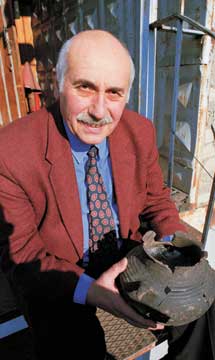  Left: The Director of the Centre for Archaeological
Studies in Tbilisi, Georgia, with finds from the BTC route. Left: The Director of the Centre for Archaeological
Studies in Tbilisi, Georgia, with finds from the BTC route.
At the other end of the line, terminal expansion at Sangachal,
involving work for both the BTC project and development of the
Azeri-Chirag-Gunashli oil field, is about two-thirds done. Two
new storage tanks, each 22m high and 100m in diameter, are being
built and construction of the BTC head pumping station has commenced.
Sangachal's storage capacity will reach 2.5mn barrels of oil
on completion of the work.
These achievements have coincided with complex financial agreements
in Washington and London, discussions with 450 communities along
the route and agreement with many on a $37 million programme
of social and environmental investment. Numerous regulatory authorities,
civil society organisations and international financial bodies
have been involved, 11,000 pages of documentation have been prepared
and issued by the BTC Co. and compensation payments made to about
half the 50,000 individual land owners, municipalities and government
departments.
According to the present plans, the Azerbaijani segment of the
line will be commissioned in September 2004, with the Georgian
segment following in November and the three Turkish segments
by the end of the year or early 2005. Several months of pipeline
integrity testing and filling of the line will follow, with loading
of the first tanker at Ceyhan expected in Spring 2005.
By the time the BTC pipeline is completed, it is expected to
have involved 52 million manhours of effort. Almost 150,000 joints
of linepipe, each 12m in length and weighing some 655,000 tonnes
in total, will have been laid.
Eight pump stations, each covering 15-20 hectares, will have
been built. And more than 100 block valves, typically measuring
five meters high and weighing about 30 tonnes, will have been
incorporated into the pipeline to enable it to be isolated in
sections.
Economic Impact
With BTC construction a reality, statistics from the Azerbaijani
and Georgian governments are reflecting the impact the BTC project
is having on national economies.
Thanks in part to new export opportunities being opened by the
BTC route, Azerbaijan's oil and gas sector expects $2.5 billion
to be invested in the industry in 2004 - 90 percent of all the
new resources likely to be invested in the economy next year.
Total foreign direct investment in Azerbaijan in 2004 is expected
to reach $3bn - the great majority being in the hydrocarbons
sector. The national economy is set to grow at an annual rate
of 9 percent in 2004 on the back of rising oil and gas production.
In Georgia, economic growth is at a six-year high, with the influence
of the BTC project accounting for about half the upsurge. A recent
report by The Economist Intelligence Unit (EIU) found that activity
associated with construction of the BTC route is having a significant
impact in every sector of the economy.
"The only foreign direct investment (FDI) of note is the
construction of the BTC oil pipeline," it stated. "Inflows
of FDI will be sufficient to finance the external deficit, and
activity in this sector will result in an increase in employment
and wages, spurring a resurgence in domestic demand. Pipeline
activity will also have important knock-on effects in some related
sectors, such as telecommunications and transport."
The EIU predicts 8 percent growth in Georgia in 2004 rising to
10 percent in 2005. According to figures issued by the Georgian
International Oil Corporation, almost 2,700 Georgian citizens
were engaged in pipeline construction at the end of October 2003,
including more than 1,000 in building processes and 1,100 in
construction of BTC infrastructure. Figures released by the IFC
and EBRD in November indicate that over the life of the pipeline,
Azerbaijan can expect revenues worth between $31-42bn and Turkey
about $1.5bn. For its part Georgia anticipates transit fee income
of $508mn over 20 years - equivalent to a 15 percent boost to
its annual gross domestic product.
Local companies are already experiencing many benefits. In Azerbaijan,
more than 100 local businesses have been awarded BTC-related
contracts. RT Services won a tender in October for waste collection
and transportation. The company, established in 2002, has a plant
in Sumgayit that recycles plastic waste and makes plastic pipe
for export. Azad - a business that collects waste from communities
and recycles it into polyethylene products - will be supplying
bags to REM, the catering services provider for the BTC project.
Another Azeri company, Janubsanayetikinti, has been awarded a
contract for work at block valve stations and local equipment
rooms along the pipeline in Azerbaijan.
BP's spend with small-to-medium sized enterprises in Azerbaijan
in 2003 will far surpass the target of $20mn, having hit $15mn
during the first half of the year. This total does not include
contract awards won by major sub-contractors to the BTC project.
Community Investment
Since grants were made in July to fund BTC's individual country
community investment programmes along the pipeline route, scores
of quick-impact community projects have gotten underway. In many
instances, they are already completed.
In Azerbaijan, $8mn allocated for the programme was increased
to $1m through matching funds provided by international non-governmental
organizations, which will implement the programme. Four organizations:
Save the Children (SC), International Rescue Committee (IRC),
International Medical Corps (IMC) and the Foundation for International
Community Assistance (FINCA) have been selected by the BTC Co.
Over 80 communities are expected to benefit over a three-year
period up to the end of 2005.
Save the Children and the IRC each received $1.5mn to target
villages along the pipeline route and take the communities through
a hands-on, learn-by-doing process called community mobilization.
Each community will elect a number of their own members to Community
Action Groups, or Ijma groups, as they have been called in Azerbaijan.
With the assistance of the IRC and SC trainers, the Ijma groups
will identify and prioritize community needs and develop a plan
of action to address those needs. Villagers themselves will design,
implement and manage small community-driven projects that could
include the rehabilitation of schools, transformers, irrigation
systems, etc. The key to this process is the community's involvement
and ownership of the resulting project.
They are required to contribute 25 percent of the total cost
of the implemented projects - usually through in-kind donations
of labour and materials. BTC Co.'s aim is to do something together
with the community rather than just for it-above all, by encouraging
people to identify what they need and then get commitments from
all participants that will enable them to achieve their goals.
Taking this approach, IMC is using its grant to train at least
265 doctors and nurses in primary healthcare along the pipeline
route, as well as rehabilitating clinics and equipping them with
equipment and medicines in 30 communities. IMC will also establish
community-supported health funds or health insurance mechanisms
as a way to make the projects sustainable. The funds will defray
or eliminate fees for medical services and medicines and supplement
the salaries of clinic staff.
Working a completely different sector, FINCA made its first loan
to small business recently, extending $890 credit to a group
of six entrepreneurs in Ganja, northwest Azerbaijan, to enable
them to start up a small clothes trading business.
Across the border in Georgia, Mercy Corps - one of two NGOs chosen
to run the $5mn Georgian community investment programme - is
playing a similar catalyst role in assisting communities in identifying
and implementing priority projects. Villages such as Pobeda,
Karatagla, Samshvilde, Birliki and Kalinino are refurbishing
school buildings. At Tsintskaro, a health clinic is being refurbished
and the water system improved.
Elsewhere irrigation systems are being rehabilitated and loans
disbursed to micro-entrepreneurs. In all, more than 150 infrastructure
rehabilitation initiatives will be implemented in Georgia between
now and the end of 2005. In addition, agricultural support, energy
efficiency projects and other capacity building activities will
run parallel. CARE, which implements the programme in the West
of the country, has set up more than 200 demonstration farms
to train farmers in best agricultural practices which are already
resulting in increased potato yields.
In Turkey, $9m was allocated for a community investment programme.
Approximately $3m was granted in July and August to fund a first
phase in the poorest regions of North East Anatolia. The grantees
and local communities are required to contribute at least 20
percent to the cost of the projects in cash, sweat equity (labour)
or land. The intention is to contribute to sustainable rural
development in the five provinces of Ardahan, Kars, Erzurum,
Gumushane and Erzincan through long-term partnerships with local
communities and local authorities in more than 130 villages.
Grants were awarded to four local organizations - two NGOs (IBC
and SURKAL), Ataturk University and a private consultancy - PAR
Consulting in partnership with an NGO (RUDF).
The first results of quick impact projects are now coming through.
At Hocuvan Haskoy - a cattle-rearing village of about 1,500 residents
in the Ardahan province in northeast Turkey - the International
Blue Crescent Foundation has organised the construction of a
large storage tank and a 16km water distribution system for the
village. Clean drinking water is now available from taps installed
in the houses. Hocuvan Haskoy is one of 17 settlements in the
pipeline corridor in Ardahan that will benefit from the programme,
which has been made possible with the help and support of the
local state authorities. The main focus for IBC, however, will
be in implementing long-term sustainable programmes focusing
on agriculture and livestock improvements, cooperative development,
milk collection and processing centres, and health care improvements.
Human Rights Reinforced
At the end of September the BTC Co. formally agreed that it will
not seek compensation from the governments of Azerbaijan, Georgia
and Turkey for any breaches of the Host Government Agreements
(HGAs) where the host government is acting on an obligation under
international human rights, environmental or other treaties to
which it is a party.
Called the BTC Human Rights Undertaking, the agreement is legally
binding and has been developed following discussions with Amnesty
International and other NGOs. It was signed in London by BTC
chief executive Michael Townshend.
The Undertaking clarifies clauses in the HGAs - part of the legal
framework governing the BTC pipeline - that provide stability
for the project in the event of changes to the legal or fiscal
regimes in the three countries. It confirms that the HGAs' arbitration
provisions will not be used to hinder individuals' access to
domestic courts and that the standards applicable to the BTC
Company will evolve as international standards evolve.
The BTC Co also decided to make the project's complex legal arrangements
more accessible by publishing an HGA summary in Azeri, English,
Georgian and Turkish. These summaries can be viewed on the project's
website: caspiandevelopmentandexport.com by accessing the Citizen's
Guide section.
Meanwhile, the first report of an expert panel asked to review
the project's Resettlement Action Plans (RAPs) and its environmental
and social action plans was issued at the end of October. A second
review will take place in February 2004.
The panel made four recommendations:
(1) That "a definitive strategy and implementation plan
for returning rights of use to the former owners and/or lessees
of the pipeline corridor needs to be developed...and adequately
disclosed."
(2) That monitoring of temporary land acquisition be stepped
up to ensure that it is compliant with World Bank guidelines.
(3) That BTC Co. and its contractors remember that land only
may be occupied without prior compensation when landowners' whereabouts
are unknown.
(4) That the grievance mechanism for correcting resettlement
issues be improved to ensure consistency.
Overall, the panel stated: "BTC Co. has executed the processes
of community preparation, negotiation, agreement signing and
compensation payment for the BTC pipeline project to standards
equal to, or exceeding, the requirements of World Bank guidelines.
Given that 20,279 agreements had been signed at the time of the
review involving consents from an estimated 50,000 co-owners
or shareholders, the number of complaints that had been received
was very low...There was no evidence that ethnic minorities affected
by the project were any more or less disadvantaged than other
project-affected groups."
The panel's recommendations have been accepted by BTC Co. and
remedial action is underway.
Unearthing the
Past
Significant archaeological finds continue to be made along the
pipeline right-of-way. One of the most recent is near Tabatskuri
in Georgia where artifacts from the Iron Age (800-400 B.C.) and
the Ancient Period (500 B.C.- A.D. 458.) were unearthed in August
and subsequently excavated by archaeologists from Georgia's Centre
for Archaeological Studies. This is the first site in the region
to be discovered with these two overlapping periods. The excavations
at Tabatskuri have revealed uncovered burials, stone wall remnants,
prepared floors, the remains of an oven and other iron, ceramic,
stone and wooden artifacts. According to Hope Leininger, cultural
heritage coordinator for BTC Co., much data that otherwise would
have been lost is being preserved.
Georgia, in fact, has emerged as an archaeological treasure trove.
More than 250 cultural heritage sites have been identified along
the 248km pipeline corridor that crosses the country, and the
line has been rerouted significantly in two places to avoid previously
unknown sites dating back to the Bronze Age (3,500-800 B.C.)
and Medieval periods.
More than 20 important monuments have also been identified along
the Georgian right-of-way and mitigation measures introduced
to protect them. BTC Co. is employing monitors to keep an eye
out for discoveries during construction and to ensure that finds
are treated appropriately. Among interesting discoveries made
in Georgia is a necropolis at Eli Baba near Tsalka, an Early
Bronze Age site at Orchosani near the Turkish border that appears
to be the location of several villages, and a burial site at
the PSG-2 (pump station) work area outside Tetritskaro.
Excavations are also taking place in Turkey at nine sites along
the BTC route that were identified prior to construction and
four that were the result of chance finds. One of the most significant
finds has been made at Gökdere-Yüceören in southern
Turkey where rock-cut tombs have been excavated. The tombs are
characterised by a rectangular entrance called a "dromo",
which typically has steps carved into the limestone leading to
the tomb entrance. Similar types of tombs have been found in
the ancient city of Kelenderis, within the borders of Anamur-Aydnck
district. Salvage excavations have been conducted under the supervision
of a scientific excavation director working with a team of 18
archaeologists and 50 workers. The site has been classified by
the Ministry of Culture and Tourism as a First Degree Site and
the pipeline corridor has been re-routed in this area.
In Minnetpinari along the pipeline corridor at an altitude of
1,100m, another team of 18 archaeologists and 60 villagers hired
from nearby communities started work in April on a 520 metre-long
site. Three months were set aside for the excavations which consists
of some architectural foundations, possibly that of a church,
and a cistern located in the fields to the south. During the
excavations, skeletal remains were discovered. The burials are
orientated in an east-west direction and some have borders formed
by smoothed stones. It is believed that early Christians inhabited
the site. The excavated material is to be shown to visitors to
museums in Turkey.
Another sensitive area lying on BTC's route is Azerbaijan's Gobustan
National Cultural Reserve, 60 kms southwest of Baku - a location
rich in examples of early human settlements going back 12,000
years and pre-historic rock face drawings of animals and humans.
The pipeline passes a few kilometres away from some ancient petroglyphs
and every effort is being made to ensure these priceless carvings
are not affected by pipeline construction activities.
Back to Index AI 11.4 (Winter
2003)
AI Home
| Search | Magazine
Choice
| Topics
| AI Store | Contact us
Other Web sites
created by Azerbaijan International
AZgallery.org | AZERI.org | HAJIBEYOV.com
|